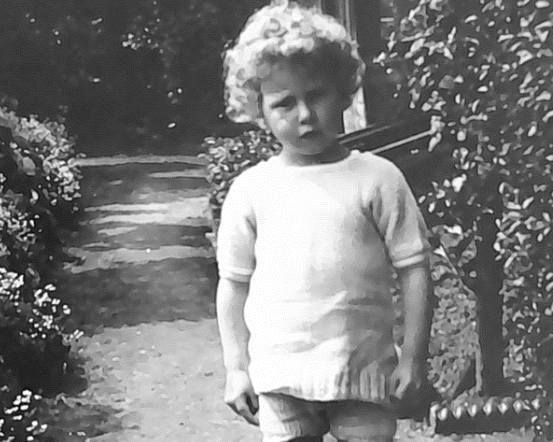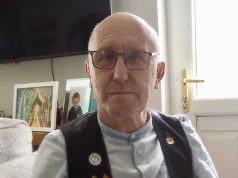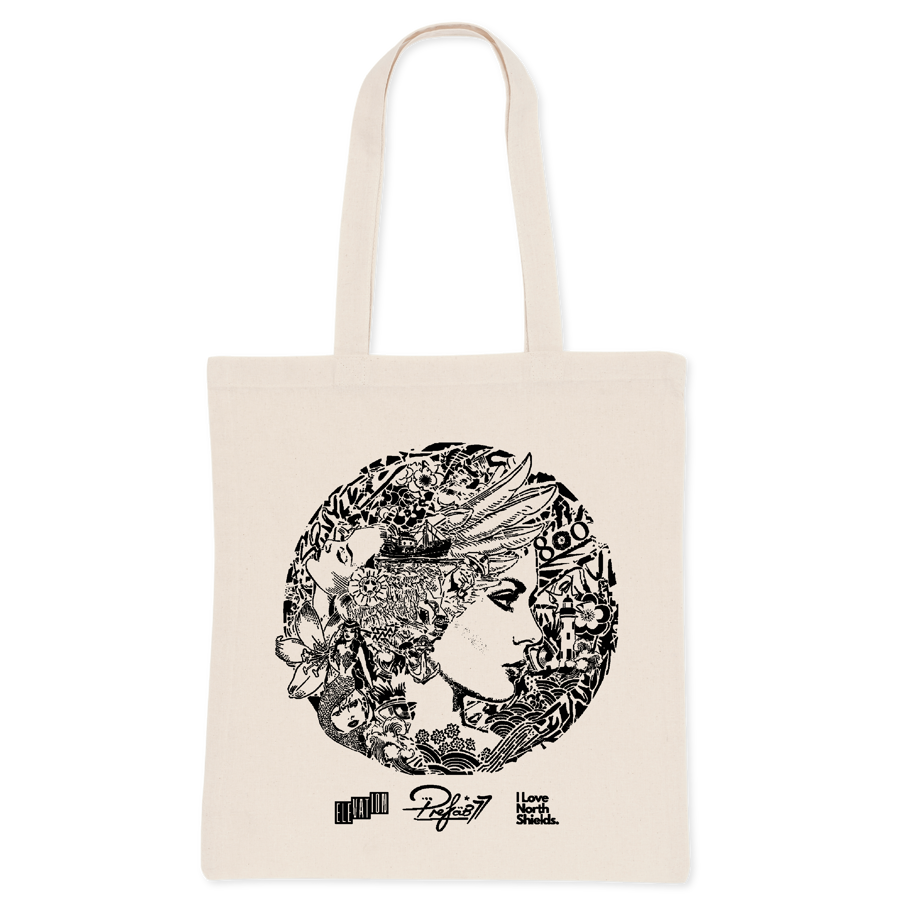By Mim Robson
Last month Mim Robson met for a chat with her 101 year old grandpa, Harold, and shared part of their chat in our October issue. This month, Harold turns 102! He has lived on the North East coast for 77 years, was married to his beloved wife Joan for 68 years, and has raised 3 children here. He now has 7 grandchildren and a growing number of great-grandchildren. Here we share the rest of Mim and Harold’s chat about what he has seen, experienced and learnt over his 102 years, not least his zip wire off the Tyne Bridge at age 93.
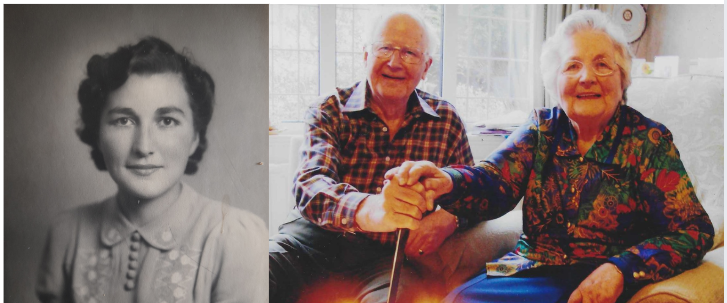
M: Thinking more in terms of a period of your life, rather than specific things, is there time in your life that you think was the happiest time?
H: [long pause]… no I think… this would very much depend on an individual’s attitude to life, and temperament. As far as I’m concerned, the present time, and always the present time whenever that was, has been the happiest time, you make the most of it. You can pick out certain things… happiest time getting married, having your first child… all significant points.
M: I suppose I wondered if there was a period of time, perhaps 5 or 10 years, where you think “that was a really good time in my life”
H: It’s very difficult to say. I think it would be wrong to pick out any particular time, because any particular period of 10 years, or whatever, they all have their moments… and you make the most of them according to your temperament or ability at the time
M: Yeah, I thought that would be an interesting question to ask you [laughs] because that’s how you’ve lived a lot of your life isn’t it, being very present.
H: The time that you’re living, as far as I’m concerned, at the time, can be the happiest, because you make the most of it according to your ability to enjoy life at that time.
M: What about when difficult things are happening, you know, like if you’ve lost family members, or work’s very stressful or…
H: Well they’re all very significant and very sad at the time, and after it, but… you learn to live with it and accept that this is part of life, it’s what has happened then, you know.
M: Thinking more in terms of a period of your life, rather than specific things, is there time in your life that you think was the happiest time?
H: [long pause]… no I think… this would very much depend on an individual’s attitude to life, and temperament. As far as I’m concerned, the present time, and always the present time whenever that was, has been the happiest time, you make the most of it. You can pick out certain things… happiest time getting married, having your first child… all significant points.
M: I suppose I wondered if there was a period of time, perhaps 5 or 10 years, where you think “that was a really good time in my life”
H: It’s very difficult to say. I think it would be wrong to pick out any particular time, because any particular period of 10 years, or whatever, they all have their moments… and you make the most of them according to your temperament or ability at the time
M: Yeah, I thought that would be an interesting question to ask you [laughs] because that’s how you’ve lived a lot of your life isn’t it, being very present.
H: The time that you’re living, as far as I’m concerned, at the time, can be the happiest, because you make the most of it according to your ability to enjoy life at that time.
M: What about when difficult things are happening, you know, like if you’ve lost family members, or work’s very stressful or…
H: Well they’re all very significant and very sad at the time, and after it, but… you learn to live with it and accept that this is part of life, it’s what has happened then, you know.
something that’s been part of your life because of your family, or just because of who you are, or whether it possibly ties in with your time in the army… because that would have been very structured. I wondered if you took to that well because it was in your nature already, or whether that time in your life was so formative that it has actually contributed to you having quite a routined and structured life going forwards.
H: Yes well I think I was brought up in a fairly structured sort of way. Which I think was a good thing. And then that was reinforced you might say by the war years and going into the army, where things were very structured obviously, and that fitted my temperament very well.
M: So do you think it a bit of nature and nurture, neither one nor the other really…
H: Yes I think it’s a combination of the two. Yes I think initially it goes back to your own parenting. My parents, because I mean they’re from the Victorian era, they brought us up in a very structured way, which I think was a very good thing, but in a very loving way, you know.
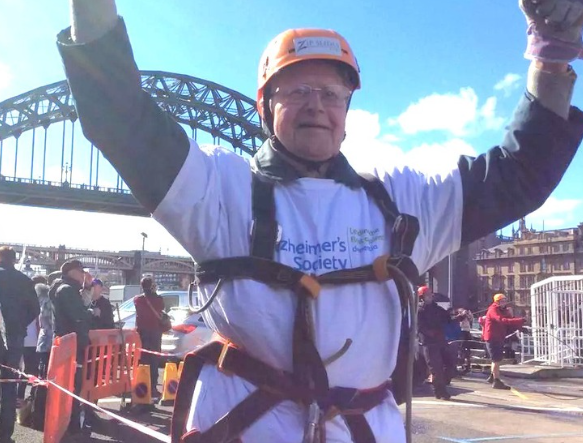
M: And then what do you think has kept you so well and happy in your life apart from that?
H. It’s difficult to say, it’s really just down to your temperament, how you… accept things as they are, and so on… it’s… I don’t think there’s any one particular aspect of it… it’s just I mean… within the family, within any family, you’re all brought up, presumably the same way, but different members of the family will react differently to it.
M. I think you’re right. What you’re really good at is accepting things as they are and being present with that. Have you heard, there’s a quote, “Comparison is the thief of joy”?
H: [laughs] I’ve not heard of that.
M: Well I think it’s true, because if you are always looking at what could have been, or what could be, then you’re never going to be happy.
H: Yes, probably.
M: But I think as well, it’s difficult now, the way that life’s changed, because it’s impossible to not be confronted with endless choices. So it’s then very difficult to avoid that comparing and wondering whether there’s a better option.
H: Well this is where your innate being comes in, because you can either be a bit dissatisfied with the way things are, or when things go wrong you can say, well that’s it, get on with it, you know, accept it. As far as I’m concerned, the latter is the case. You say right, this is the situation, ok, you can’t do anything about it, right, get on.
M. Yeah, I think I’m prone to that as well, but in a less clear way. I think you have to accept that that’s what’s happened. But it’s also… a bit of… you also have to process it a bit as well. So I think I’ve always been doing both things at once, sort of lamenting things a bit but also ultimately being quite accepting really. But… it’s about having a positive attitude to life really isn’t it, and thinking… you just have to get on with life. But I would say that you’re probably more skilled at that than anyone else I know. Next question… do you have any advice or wisdom from your 101 years? Have a think…
H: …Live a day at a time, and do not fill your time by regretting the past. [long pause] I would say just live your life so that it is an expression of gratitude of being alive, really. But without being conscious of it all the time, you don’t want to ram it down other people’s throats as to how lucky you are or, anything of that sort. Just accept things as they are, and make the most of the time you have.
M: Yeah I think that’s good advice. I wanted I’d ask you about your zip wire off the Tyne Bridge.
H: Yes, yes. Of course, you did it with me.
M: I did. What made you want to do it?
H: Well purely, it’s something that I always wanted to do, but couldn’t quite drum up the… courage to do it. And then, what made me want to do it, was that after Grandma had died, I wanted to do something as a tribute to her, and in acknowledgement of the good times that we’d had together. And I thought that the way to do that would be to get this
bee out of my bonnet and do something which I’d always wanted to, and at the same time, raise funds for the Alzheimer’s Society, which I did, and in fact it raised £7000. And I felt by doing it, I’d achieved various aims, for one thing, I did something I’d often thought about doing, but never actually did it. And, I wasn’t doing it just for self satisfaction, I was doing it for a good cause, and in particular, a good cause in memory of Grandma. That was the main reason for doing it. And of course, I think those various reasons clubbed together and helped me thoroughly enjoy doing it.
M: Yeah it was great wasn’t it. Do you think it helped you sort of… in the process of… grieving Grandma as well.
H: Yes, it was part of that.
M: Sort of like a really positive…
H: Yeah. It was part of a healing process, you might say.
M: And so tell us a little bit about the actual day. So you went to the top of the Tyne Bridge… and how were you feeling when you got up there?
H. Really quite… interestingly excited, really.
M: Because I felt… sick. [laughs] I felt really nervous, and sick!
H: Funnily enough, I don’t recollect feeling nervous at all… because they were all so… the organisation was so good. And I remember two or three incidents which helped… be quite.. be quite funny… within the queue on the bridge, just before, strapped up, I think you were in front of me, did you go before me?
M: Yeah I went first because I was feeling so…
H: There was a girl, just behind me, we were talking, and I’ve often thought about this because she was obviously amazed at the age that I would be doing it, and I remember her saying “Were you in the First World War?”[laughs], well, not exactly, no.


